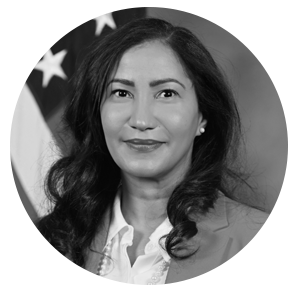Hero

Header and Body
Thank You For Joining | Available On Demand
When you think of artificial intelligence your brain likely goes to the images provided to us by Hollywood, an evil presence with glowing red eyes bent on destruction. We’re used to thinking of AI not as a tool but as an antagonist and a permanent artifact of the future.
AI however, is not the robot that rises over the hill; it’s not the unblinking eye; it is not a friend; it is not against you. It lacks malevolence, compassion, sentience, or will. But it is very real and it will be a defining feature of the military competition between the United States and high-tech adversaries in the decades to come. China, Russia and the US are all pursuing military AI but what sets the US approach apart is the conviction that humans working with AI as a team will outperform pure automation, which characterizes the Russian and Chinese efforts. What that looks like in research, development, military exercises and training will determine future military use of the most important technology of the new century.
The Defense One Genius Machines series, first launched in 2019, brings together top officials in the Defense Department as well as industry leaders, ethicists, academics and innovators on the front lines to cut through the hype on AI to discuss near and far-term futures of AI in national security, best and worst case scenarios, and best practices from key thought leaders. Join Defense One for the return of the forward-looking Genius Machines series looking at the future of AI and what it means for national security.
Speakers

Dr. Kimberly Sablon
Principal Director for Trusted Artificial Intelligence and Autonomy
Office of the Assistant Secretary of Defense for Critical Technologies

Dr. Kimberly Sablon
Principal Director for Trusted Artificial Intelligence and Autonomy
Office of the Assistant Secretary of Defense for Critical Technologies

Emelia Probasco
Senior Fellow
Georgetown’s Center for Security and Emerging Technology

Emelia Probasco
Senior Fellow
Georgetown’s Center for Security and Emerging Technology
Emelia (Emmy) Probasco is a Senior Fellow at Georgetown’s Center for Security and Emerging Technology (CSET), where she works on the military applications of Artificial Intelligence. Prior to joining CSET, she was the Chief Communications Officer and Communications Department Head at the Johns Hopkins Applied Physics Laboratory (APL), leading technical and institutional communications to support and drive APL’s strategic vision. Prior to APL, Emmy served as a Surface Warfare Officer in the U.S. Navy, deploying twice to the Indo-Pacific. She also served in the Pentagon as the speechwriter to the Chief of Naval Operations and at the U.S. Naval Academy as an instructor in political science. She has masters’ degrees in Forced Migration and Economic and Social History from Oxford University, where she studied as a Rhodes Scholar, and a degree in Political Science from the U.S. Naval Academy. She is also currently serving as a special government employee advising the Defense Innovation Unit.

Patrick Tucker
Science & Technology Editor
Defense One

Patrick Tucker
Science & Technology Editor
Defense One
Patrick Tucker is science and technology editor for Defense One. He’s also the author of The Naked Future: What Happens in a World That Anticipates Your Every Move? (Current, 2014). Previously, Tucker was deputy editor for The Futurist for nine years. Tucker has written about emerging technology in Slate, The Sun, MIT Technology Review, Wilson Quarterly, The American Legion Magazine, BBC News Magazine, Utne Reader, and elsewhere.



